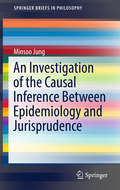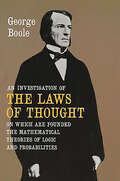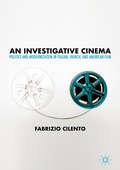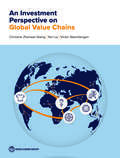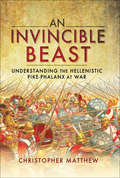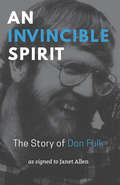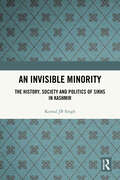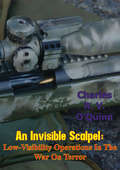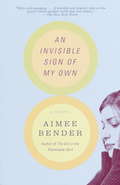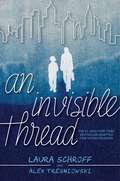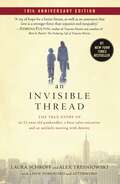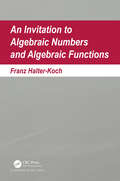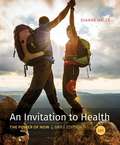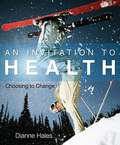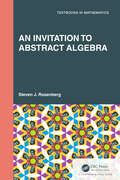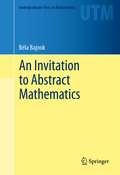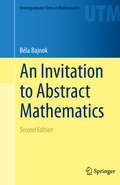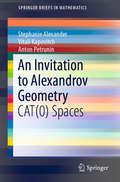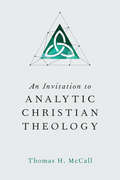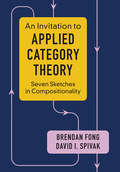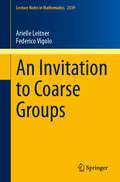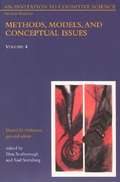- Table View
- List View
An Investigation of the Causal Inference between Epidemiology and Jurisprudence (SpringerBriefs in Philosophy)
by Minsoo JungThis book examines how legal causation inference and epidemiological causal inference can be harmonized within the realm of jurisprudence, exploring why legal causation and epidemiological causation differ from each other and defining related problems. The book also discusses how legal justice can be realized and how victims' rights can be protected. It looks at epidemiological evidence pertaining to causal relationships in cases such as smoking and the development of lung cancer, and enables readers to correctly interpret and rationally use the results of epidemiological studies in lawsuits. The book argues that in today's risk society, it is no longer possible to thwart the competence of evidence using epidemiological research results. In particular, it points out that the number of cases that struggle to prove a causal relationship excluding those using epidemiological data will lead to an increase in the number of lawsuits for damages that arise as a result of harmful materials that affect our health. The book argues that the responsibility to compensate for damages that have actually occurred must be imputed to a particular party and that this can be achieved by understanding causal inferences between jurisprudence and epidemiology. This book serves as a foundation for students, academics and researchers who have an interest in epidemiology and the law, and those who are keen to discover how jurisprudence can bring these two areas together.
An Investigation of the Laws of Thought
by George BooleGeorge Boole was on of the greatest mathematicians of the 19th century, and one of the most influential thinkers of all time. Not only did he make important contributions to differential equations and calculus of finite differences, he also was the discoverer of invariants, and the founder of modern symbolic logic. According to Bertrand Russell, "Pure mathematics was discovered by George Boole in his work published in 1854."This work is the first extensive statement of the modern view that mathematics is a pure deductive science that can be applied to various situations. Boole first showed how classical logic could be treated with algebraic terminology and operations, and then proceeded to a general symbolic method of logical interference; he also attempted to devise a calculus of probabilities which could be applied to situations hitherto considered beyond investigation.The enormous range of this work can be seen from chapter headings: Nature and Design of This Work; Signs and Their Laws; Derivation of Laws; Division of Propositions; Principles of Symbolical Reasoning; Interpretation; Elimination; Reduction; Methods of Abbreviation; Conditions of a Perfect Method; Secondary Propositions; Methods in Secondary Propositions; Clarke and Spinoza; Analysis, Aristotelian Logic; Theory of Probabilities; General Method in Probabilities; Elementary Illustrations; Statistical Conditions; Problems on Causes; Probability of Judgments; Constitution of the Intellect. This last chapter, Constitution of the Intellect, is a very significant analysis of the psychology of discovery and scientific method.
An Investigative Cinema: Politics and Modernization in Italian, French, and American Film
by Fabrizio CilentoThis book traces the development of investigative cinema, whose main characteristic lies in reconstructing actual events, political crises, and conspiracies. These documentary-like films refrain from a simplistic reconstruction of historical events and are mainly concerned with what does not immediately appear on the surface of events. Consequently, they raise questions about the nature of the “truth” promoted by institutions, newspapers, and media reports. By highlighting unanswered questions, they leave us with a lack of clarity, and the questioning of documentation becomes the actual narrative. Investigative cinema is examined in relation to the historical conjunctures of the “economic miracle” in Italy, the simultaneous decolonization and reordering of culture in France, the waves of globalization and neoliberalism in post-dictatorial Latin America, and the post-Watergate, post-9/11 climate in US society. Investigative cinema is exemplified by the films Salvatore Giuliano, The Battle of Algiers, The Parallax View, Gomorrah, Zero Dark Thirty, and Citizenfour.
An Investment Perspective on Global Value Chains
by Yan Liu Christine Zhenwei Qiang Victor SteenbergenThis report investigates the role of foreign direct investment (FDI) in helping developing countries participate in global value chains (GVCs). It combines the perspectives and strategies from three types of players: multinational corporations, domestic firms and governments. It aims to provide practical guidance for developing countries to develop strategies that use FDI to strengthen GVC participation and upgrading. The report has six main chapters: 1. FDI and GVCs. Assesses the trade-investment nexus and analyzes the effect of FDI in countries’ GVC participation and upgrading at the country level. 2. MNCs shape GVC development. Highlights MNCs' contribution to global economy and how their business strategies shape the evolution of GVCs. The chapter also compares MNCs' business strategies in terms of outsourcing and offshoring, risk mitigation and increasing market power across GVC archetypes. 3. Domestic firm perspectives on GVC participation. Looks at the various paths domestic firms can take to internationalize their production and trade. Investigates domestic firm characteristics that predict higher GVC participation, and the effect of GVC participation on firm performance. 4. Investment policy and promotion: what is in a government’s toolbox? Summarizes the various policy instruments governments have at their disposal to help attract MNCs to their country and facilitate GVC participation of domestic firms. 5. Integrating countries into GVCs. Draws on a range of case studies to illustrate how governments can develop coherent strategies and policy packages to integrate their countries into GVCs. 6. FDI and GVCs in the wake of COVID-19. Reflects the impact of COVID-19 on FDI and GVCs, the response from multinationals and suppliers, and the implications for GVC reconfiguration. In addition, there are seven case studies that offer more nuanced analysis on the GVC participation in selected countries and sectors: • Five qualitative case studies: Five countries have been selected that managed to use FDI to stimulate GVC participation using a range of approaches. By design, these five countries also cover five different GVC archetypes. These countries are: (1) Kenya (horticulture); (2) Dominican Republic (textiles); (3) Mauritius (tourism); (4) Malaysia (electronics); (5) China (software). • Two quantitative case studies: Rwanda, West-Bengal (India). These use a combination of firm- and transaction level datasets to study firm-level dynamics that explain the role of multinational and domestic firms across GVCs.
An Invincible Beast: Understanding the Hellenistic Pike Phalanx in Action
by Christopher MatthewThe Hellenistic pike-phalanx was a true military innovation, transforming the face of warfare in the ancient world. For nearly 200 years, from the rise of the Macedonians as a military power in the mid-fourth century BC, to their defeat at the hands of the Romans at Pydna in 168BC, the pike-wielding heavy infantryman (the phalangite) formed the basis of nearly every Hellenistic army to deploy on battlefields stretching from Italy to India. And yet, despite this dominance, and the vast literature dedicated to detailing the history of the Hellenistic world, there remains fierce debate among modern scholars about how infantry combat in this age was actually conducted.Christopher Matthews critically examines phalanx combat by using techniques such as physical re-creation, experimental archaeology, and ballistics testing, and then comparing the findings of this testing to the ancient literary, artistic and archaeological evidence, as well as modern theories. The result is the most comprehensive and up-to-date study of what heavy infantry combat was like in the age of Alexander the Great and his successors.
An Invincible Spirit: The Story of Don Fulk
by Janet Allen“Don taught us how to be a real independent living center. Nothing was easy; every issue that came up on the road to Don’s independence was a challenge and a struggle, but the experience pushed us and we learned from it. We were not going to let Don down; all of us were committed to Don’s freedom and independence.” —Kathleen Kleinman, Executive Director, TRPIL (Transitional Paths to Independent Living) Profoundly deafened as an infant, Don Fulk didn’t learn his name or go to school until the age of ten. When he was eighteen years old and a budding superstar on his football and basketball teams, he broke his neck in a swimming accident, and became paralyzed. After his injury, he was confined to a bed in his parents’ home for eight years, unable to move and barely able to communicate. After his family could no longer care for him, he spent nine years in a nursing home where he suffered from abuse and neglect. Yet through a life marred by isolation and frustration, Fulk endured with strength, humor, and grace. He never gave up pursuing his dreams for independence and self-worth, and improving the lives of others. He fought a system that was unfair and discriminatory, and helped pave the way for people with disabilities to live independently. Don Fulk signed his story to author Janet Allen, describing his difficult home life, the incredible friends who changed his life, and his dramatic escape from an abusive nursing home. An Invincible Spirit is a story of hope, empowerment, and the battles people with disabilities have fought—and continue to fight—to improve the quality of their lives.
An Invincible Spirit: The Story of Don Fulk
by Janet Allen“Don taught us how to be a real independent living center. Nothing was easy; every issue that came up on the road to Don’s independence was a challenge and a struggle, but the experience pushed us and we learned from it. We were not going to let Don down; all of us were committed to Don’s freedom and independence.” —Kathleen Kleinman, Executive Director, TRPIL (Transitional Paths to Independent Living) Profoundly deafened as an infant, Don Fulk didn’t learn his name or go to school until the age of ten. When he was eighteen years old and a budding superstar on his football and basketball teams, he broke his neck in a swimming accident, and became paralyzed. After his injury, he was confined to a bed in his parents’ home for eight years, unable to move and barely able to communicate. After his family could no longer care for him, he spent nine years in a nursing home where he suffered from abuse and neglect. Yet through a life marred by isolation and frustration, Fulk endured with strength, humor, and grace. He never gave up pursuing his dreams for independence and self-worth, and improving the lives of others. He fought a system that was unfair and discriminatory, and helped pave the way for people with disabilities to live independently. Don Fulk signed his story to author Janet Allen, describing his difficult home life, the incredible friends who changed his life, and his dramatic escape from an abusive nursing home. An Invincible Spirit is a story of hope, empowerment, and the battles people with disabilities have fought—and continue to fight—to improve the quality of their lives.
An Invisible Force: The Quest to Define the Laws of Motion (Panorama)
by Glen PhelanNIMAC-sourced textbook
An Invisible Minority: The History, Society and Politics of Sikhs in Kashmir
by Komal JB SinghThis book presents a groundbreaking study of the Kashmiri Sikh community, examining how identities are formed and negotiated across the intersections of religion, region, and nation. Combining deep ethnographic engagement with historical analysis, it examines Kashmir beyond the hegemonic boundaries of the Hindu-Muslim binary, by foregrounding an alternative discourse to see how majority–minority relations in a volatile region like Kashmir unfold, how the Sikh minority within the minorities is silenced in everyday discourses, and how all minorities are pushed to the margins. The author studies the themes of alienation, moments of solidarity, and cooperation between the various communities in Kashmir. This book traces the rich and often untold history of Sikhs in Kashmir from the visits of various Gurus, Maharaja Ranjit Singh rule to Singh Sabha Movement. It explores the traumatic history of partition, 1984 violence to Chittisinghpora Massacre. Thus, it traces a journey of faith, reform, and resilience.Numerically, Sikhs presently are the largest minority community living in Kashmir presently and therefore, crucial to any understanding of Kashmir. The book will be of use to students and researchers of history, Sikh studies, sociology, religion, minority studies, anthropology, and South Asian studies.
An Invisible Scalpel: Low-Visibility Operations in the War on Terror
by Charles R. V. O’QuinnThe War on Terror (WOT) is actually a war against extremist insurgents comprised of numerous and varied organizations scattered across the globe. They are spurred to action by an extremist ideology that is nurtured, demonstrated, and led by al Qaeda and its leadership. This ideology serves as the insurgency's center of gravity whereby it gains all manner of support across a broad spectrum of functional resources in multiple operational domains. As operating environments change, these ideology inspired decentralized insurgent organizations are able to quickly adapt their methods of operation. In order to defeat this evolving, ubiquitous yet elusive threat, the US must develop a comprehensive strategy that incorporates all instruments of US national power, as well as those of its allies. This strategy must also defeat or mitigate the enemy's center of gravity in order to have any chance of success. This thesis argues that as lead combatant command in the WOT, the US Special Operations Command (USSOCOM) should conduct continuous, global, pre-emptive low-visibility operations in order to disrupt insurgent operations. In order to accomplish its WOT missions, USSOCOM must effectively organize and array forces and resources to defeat insurgent functional resources across multiple operational domains.
An Invisible Sign of My Own: A Novel
by Aimee BenderAimee Bender's stunning debut collection, The Girl in the Flammable Skirt, proved her to be one of the freshest voices in American fiction. Now, in her first novel, she builds on that early promise.Mona Gray was ten when her father contracted a mysterious illness and she became a quitter, abandoning each of her talents just as pleasure became intense. The only thing she can't stop doing is math: She knocks on wood, adds her steps, and multiplies people in the park against one another. When Mona begins teaching math to second-graders, she finds a ready audience. But the difficult and wonderful facts of life keep intruding. She finds herself drawn to the new science teacher, who has an unnerving way of seeing through her intricately built façade. Bender brilliantly directs her characters, giving them unexpected emotional depth and setting them in a calamitous world, both fancifully surreal and startlingly familiar.From the Trade Paperback edition.
An Invisible Thread: A Young Readers' Edition
by Alex Tresniowski Laura SchroffFrom New York Times bestselling authors Laura Schroff and Alex Tresniowski comes the young readers edition of an unbelievable memoir about an unlikely friendship that forever changed the lives of a busy sales executive and a hungry eleven-year-old boy.On one rainy afternoon, on a crowded New York City street corner, eleven-year-old Maurice met Laura. Maurice asked Laura for spare change because he was hungry, and something made Laura stop and ask Maurice if she could take him to lunch. Maurice and Laura went to lunch together, and also bought ice cream cones and played video games. It was the beginning of an unlikely and magical friendship that changed both of their lives forever. An Invisible Thread is the true story of the bond between an eleven-year-old boy and a busy sales executive; a heartwarming journey of hope, kindness, adventure, and love—and the power of fate to help us find our way.
An Invisible Thread: The True Story of an 11-Year-Old Panhandler, a Busy Sales Executive, and an Unlikely Meeting with Destiny (Current Practices in Ophthalmology)
by Valerie Salembier Alex Tresniowski Laura SchroffAn Invisible Thread tells of the life-long friendship between a busy sales executive and a disadvantaged young boy, and how both of their lives were changed by what began as one small gesture of kindness.When Laura Schroff brushed by a young panhandler on a New York City corner one rainy afternoon, something made her stop and turn back. She took the boy to lunch at the McDonald's across the street that day. And she continued to go back, again and again for the next four years until both their lives had changed dramatically. Nearly thirty years later, that young boy, Maurice, is married and has his own family. Now he works to change the lives of disadvantaged kids, just like the boy he used to be. An Invisible Thread is the true story of the bond between a harried sales executive and an eleven-year-old boy who seemed destined for a life of poverty. It is the heartwarming story of a friendship that has spanned three decades and brought meaning to an over-scheduled professional and hope to a hungry and desperate boy living on the streets.
An Invitation To Algebraic Numbers And Algebraic Functions
by Franz Halter-KochThe author offers a thorough presentation of the classical theory of algebraic numbers and algebraic functions which both in its conception and in many details differs from the current literature on the subject. The basic features are: Field-theoretic preliminaries and a detailed presentation of Dedekind’s ideal theory including non-principal orders and various types of class groups; the classical theory of algebraic number fields with a focus on quadratic, cubic and cyclotomic fields; basics of the analytic theory including the prime ideal theorem, density results and the determination of the arithmetic by the class group; a thorough presentation of valuation theory including the theory of difference, discriminants, and higher ramification. The theory of function fields is based on the ideal and valuation theory developed before; it presents the Riemann-Roch theorem on the basis of Weil differentials and highlights in detail the connection with classical differentials. The theory of congruence zeta functions and a proof of the Hasse-Weil theorem represent the culminating point of the volume. The volume is accessible with a basic knowledge in algebra and elementary number theory. It empowers the reader to follow the advanced number-theoretic literature, and is a solid basis for the study of the forthcoming volume on the foundations and main results of class field theory. Key features: • A thorough presentation of the theory of Algebraic Numbers and Algebraic Functions on an ideal and valuation-theoretic basis.• Several of the topics both in the number field and in the function field case were not presented before in this context.• Despite presenting many advanced topics, the text is easily readable. Franz Halter-Koch is professor emeritus at the university of Graz. He is the author of “Ideal Systems” (Marcel Dekker,1998), “Quadratic Irrationals” (CRC, 2013), and a co-author of “Non-Unique Factorizations” (CRC 2006).
An Invitation To Health (Tenth Brief Edition): The Power of Now
by Dianne HalesExplore AN INVITATION TO HEALTH, The Power of Now, Brief, 10th Edition, where renowned author Dianne Hales helps you commit to a healthier lifestyle. From physical and mental health to social and sexual issues, this personal health text candidly explores the mind, body, and spirit, and shows you how to start making better health choices today.
An Invitation To Health: Choosing To Change
by Dianne HalesCurrent, comprehensive, and personal, Dianne Hales's AN INVITATION TO HEALTH CHOOSING TO CHANGE integrates a comprehensive presentation of health concepts with a wealth of practical ways to apply them to your life--body, mind, and spirit. With the complete texbook program, you have an outstanding set of tools to help you understand the positive benefits of good health behaviors and master the steps that empower you to accomplish that change in your own life. Each chapter includes content and applications such as "Learn It/Live It," "Goal Setting," "Your Strategies for Change," "Your Strategies for Prevention," and "Your Life Change Coach" sections, all of which help you on your way to setting and attaining your goals for a healthier lifestyle. Because personal choice is an important component of changing for lifelong healthy living, the text also includes "Reality Check" and "Point/CounterPoint," two new features designed to sharpen your critical thinking and analytical skills--the keys to making informed choices for positive change.
An Invitation to Abstract Algebra (Textbooks in Mathematics)
by Steven J. RosenbergStudying abstract algebra can be an adventure of awe-inspiring discovery. The subject need not be watered down nor should it be presented as if all students will become mathematics instructors. This is a beautiful, profound, and useful field which is part of the shared language of many areas both within and outside of mathematics. To begin this journey of discovery, some experience with mathematical reasoning is beneficial. This text takes a fairly rigorous approach to its subject, and expects the reader to understand and create proofs as well as examples throughout. The book follows a single arc, starting from humble beginnings with arithmetic and high-school algebra, gradually introducing abstract structures and concepts, and culminating with Niels Henrik Abel and Evariste Galois’ achievement in understanding how we can—and cannot—represent the roots of polynomials. The mathematically experienced reader may recognize a bias toward commutative algebra and fondness for number theory. The presentation includes the following features: Exercises are designed to support and extend the material in the chapter, as well as prepare for the succeeding chapters. The text can be used for a one, two, or three-term course. Each new topic is motivated with a question. A collection of projects appears in Chapter 23. Abstract algebra is indeed a deep subject; it can transform not only the way one thinks about mathematics, but the way that one thinks—period. This book is offered as a manual to a new way of thinking. The author’s aim is to instill the desire to understand the material, to encourage more discovery, and to develop an appreciation of the subject for its own sake.
An Invitation to Abstract Mathematics (Undergraduate Texts in Mathematics)
by Béla BajnokThis undergraduate textbook is intended primarily for a transition course into higher mathematics, although it is written with a broader audience in mind. The heart and soul of this book is problem solving, where each problem is carefully chosen to clarify a concept, demonstrate a technique, or to enthuse. The exercises require relatively extensive arguments, creative approaches, or both, thus providing motivation for the reader. With a unified approach to a diverse collection of topics, this text points out connections, similarities, and differences among subjects whenever possible. This book shows students that mathematics is a vibrant and dynamic human enterprise by including historical perspectives and notes on the giants of mathematics, by mentioning current activity in the mathematical community, and by discussing many famous and less well-known questions that remain open for future mathematicians. Ideally, this text should be used for a two semester course, where the first course has no prerequisites and the second is a more challenging course for math majors; yet, the flexible structure of the book allows it to be used in a variety of settings, including as a source of various independent-study and research projects.
An Invitation to Abstract Mathematics (Undergraduate Texts in Mathematics)
by Béla BajnokThis undergraduate textbook promotes an active transition to higher mathematics. Problem solving is the heart and soul of this book: each problem is carefully chosen to demonstrate, elucidate, or extend a concept. More than 300 exercises engage the reader in extensive arguments and creative approaches, while exploring connections between fundamental mathematical topics.Divided into four parts, this book begins with a playful exploration of the building blocks of mathematics, such as definitions, axioms, and proofs. A study of the fundamental concepts of logic, sets, and functions follows, before focus turns to methods of proof. Having covered the core of a transition course, the author goes on to present a selection of advanced topics that offer opportunities for extension or further study. Throughout, appendices touch on historical perspectives, current trends, and open questions, showing mathematics as a vibrant and dynamic human enterprise.This second edition has been reorganized to better reflect the layout and curriculum of standard transition courses. It also features recent developments and improved appendices. An Invitation to Abstract Mathematics is ideal for those seeking a challenging and engaging transition to advanced mathematics, and will appeal to both undergraduates majoring in mathematics, as well as non-math majors interested in exploring higher-level concepts.From reviews of the first edition:Bajnok’s new book truly invites students to enjoy the beauty, power, and challenge of abstract mathematics. … The book can be used as a text for traditional transition or structure courses … but since Bajnok invites all students, not just mathematics majors, to enjoy the subject, he assumes very little background knowledge. Jill Dietz, MAA ReviewsThe style of writing is careful, but joyously enthusiastic…. The author’s clear attitude is that mathematics consists of problem solving, and that writing a proof falls into this category. Students of mathematics are, therefore, engaged in problem solving, and should be given problems to solve, rather than problems to imitate. The author attributes this approach to his Hungarian background … and encourages students to embrace the challenge in the same way an athlete engages in vigorous practice. John Perry, zbMATH
An Invitation to Alexandrov Geometry: CAT(0) Spaces (SpringerBriefs in Mathematics)
by Stephanie Alexander Vitali Kapovitch Anton PetruninAimed toward graduate students and research mathematicians, with minimal prerequisites this book provides a fresh take on Alexandrov geometry and explains the importance of CAT(0) geometry in geometric group theory. Beginning with an overview of fundamentals, definitions, and conventions, this book quickly moves forward to discuss the Reshetnyak gluing theorem and applies it to the billiards problems. The Hadamard–Cartan globalization theorem is explored and applied to construct exotic aspherical manifolds.
An Invitation to Analytic Christian Theology
by Thomas H. McCallIn recent decades a new movement has arisen, bringing the conceptual tools of analytic philosophy to bear on theological reflection. Called analytic theology, it seeks to bring a clarity of thought and a disciplined use of logic to the work of constructive Christian theology. In this introduction to analytic theology for specialists and nonspecialists alike, Thomas McCall lays out what it is and what it isn't. The goal of this growing and energetic field is not the removal of all mystery in theology. At the same time, it insists that mystery must not be confused with logical incoherence. McCall explains the connections of analytic theology to Scripture, Christian tradition and culture, using case studies to illuminate his discussion. Beyond mere description, McCall calls the discipline to a deeper engagement with the traditional resources of the theological task.
An Invitation to Applied Category Theory: Seven Sketches in Compositionality
by David I. Spivak Brendan FongCategory theory is unmatched in its ability to organize and layer abstractions and to find commonalities between structures of all sorts. No longer the exclusive preserve of pure mathematicians, it is now proving itself to be a powerful tool in science, informatics, and industry. By facilitating communication between communities and building rigorous bridges between disparate worlds, applied category theory has the potential to be a major organizing force. This book offers a self-contained tour of applied category theory. Each chapter follows a single thread motivated by a real-world application and discussed with category-theoretic tools. We see data migration as an adjoint functor, electrical circuits in terms of monoidal categories and operads, and collaborative design via enriched profunctors. All the relevant category theory, from simple to sophisticated, is introduced in an accessible way with many examples and exercises, making this an ideal guide even for those without experience of university-level mathematics.
An Invitation to Coarse Groups (Lecture Notes in Mathematics #2339)
by Arielle Leitner Federico VigoloThis book lays the foundation for a theory of coarse groups: namely, sets with operations that satisfy the group axioms “up to uniformly bounded error”. These structures are the group objects in the category of coarse spaces, and arise naturally as approximate subgroups, or as coarse kernels.The first aim is to provide a standard entry-level introduction to coarse groups. Extra care has been taken to give a detailed, self-contained and accessible account of the theory. The second aim is to quickly bring the reader to the forefront of research. This is easily accomplished, as the subject is still young, and even basic questions remain unanswered. Reflecting its dual purpose, the book is divided into two parts. The first part covers the fundamentals of coarse groups and their actions. Here the theory of coarse homomorphisms, quotients and subgroups is developed, with proofs of coarse versions of the isomorphism theorems, and it is shown how coarse actions are related to fundamental aspects of geometric group theory. The second part, which is less self-contained, is an invitation to further research, where each thread leads to open questions of varying depth and difficulty. Among other topics, it explores coarse group structures on set-groups, groups of coarse automorphisms and spaces of controlled maps. The main focus is on connections between the theory of coarse groups and classical subjects, including: number theory; the study of bi-invariant metrics on groups; quasimorphisms and stable commutator length; groups of outer automorphisms; and topological groups and their actions. The book will primarily be of interest to researchers and graduate students in geometric group theory, topology, category theory and functional analysis, but some parts will also be accessible to advanced undergraduates.
An Invitation to Cognitive Science, Volume 4 (2nd edition)
by Daniel N. OshersonThe 4th volume of the series, which covers Methods, Models, and Conceptual Issues.
An Invitation to Cognitive Science, Volumes 1-3 (2nd edition)
by Edward E. Smith Daniel N. OshersonThe first three volumes of a four-volume introduction to contemporary cognitive science. The volumes are self-contained, and can be used individually in a variety of advanced undergraduate and graduate courses.
